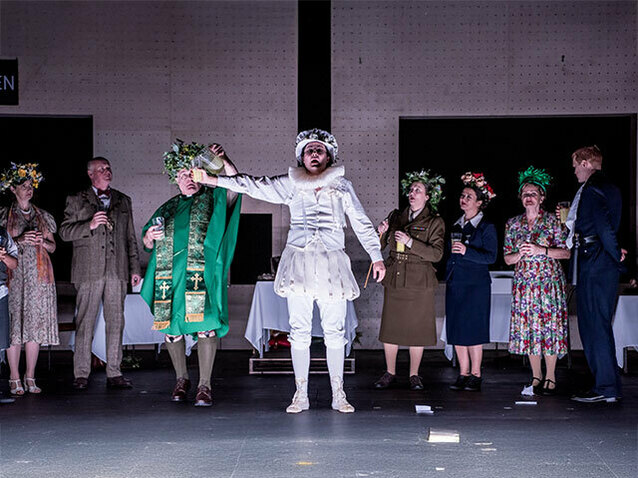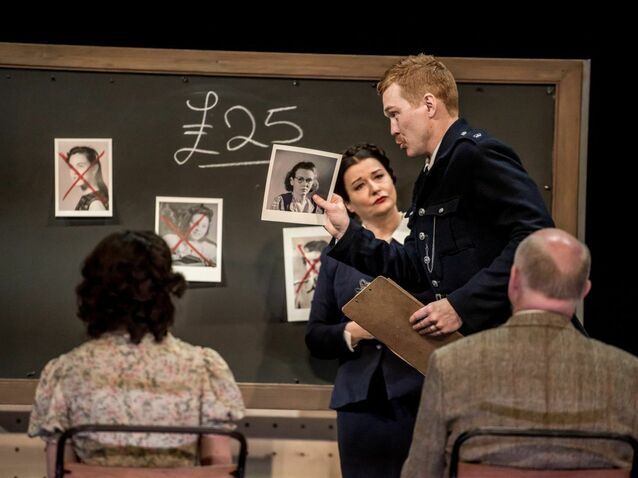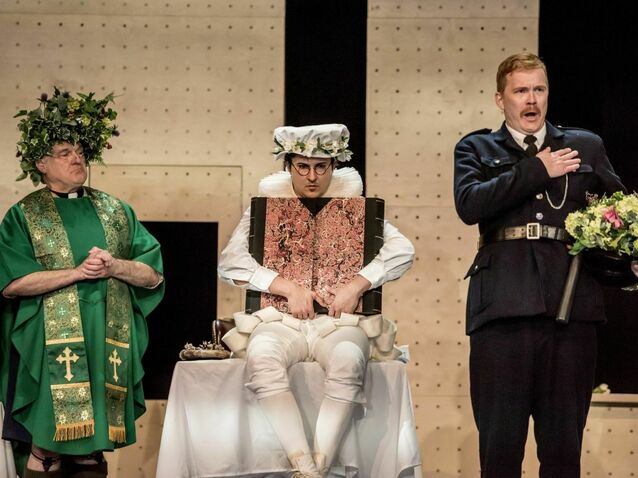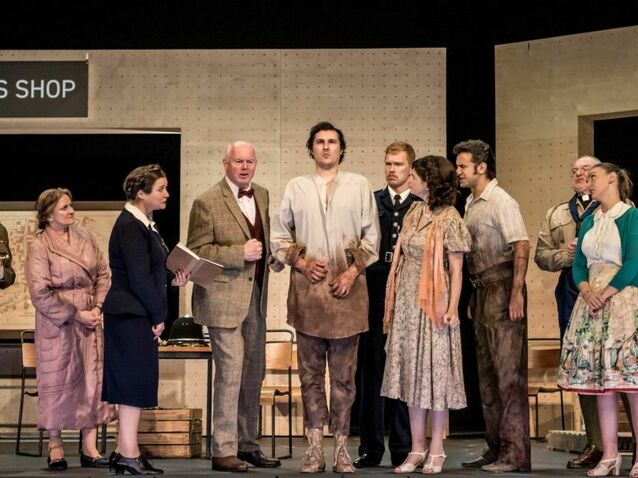 © Genevieve Girling / English National Opera
© Genevieve Girling / English National Opera
Benjamin Britten’s chamber opera Albert Herring, Op. 39, with a libretto by Eric Crozier, is based on Guy de Maupassant’s 1887 novella Le Rosier de Madame Husson, albeit with the action transposed to an English setting. Set around 1900 in Loxford, which is a fictitious town but typical of those to be found in East Suffolk, it sees Lady Billows and the community’s elite attempt to organise the annual May Day festival. They need to elect a May Queen, but the housekeeper Florence Pike has dug up the dirt on every girl nominated, thus making them unsuitable for the honour in the eyes of the committee. Superintendent Budd suggests the solution may be to elect a May King instead, as he knows of a young man in the town, Albert Herring, who is as pure as can be.
Albert, who is known and frequently teased for his timidity, works at his mother’s greengrocer’s, and is kept very much under her thumb. While he reels at the idea of being paraded in white before the entire town, Mrs Herring is thrilled because the honour comes with a prize of twenty-five sovereigns. On the day of the festival the butcher’s assistant Sid and his girlfriend Nancy, who are preparing the banquet tent, decide to have fun by slipping rum into Albert’s lemonade glass. At the feast Albert is awarded the improving but heavy Foxe’s Book of Martyrs along with the money, but when he is asked to make a speech he becomes tongue tied. This arouses everyone’s sympathy, but then he drains his spiked lemonade glass, which unleashes hiccups in him and general pandemonium in response.
That night a drunk Albert overhears Sid and Nancy discussing their pity for him before going off together. This is his breaking point, and he heads off with the prize money to look for adventure. The following morning the town panics when he cannot be found, and a search is called. When Albert’s crown of flowers from the festival is discovered, crushed by a cart, everyone assumes he is dead, but then Albert suddenly appears. He goes on to describe his drunken activities, in which he spent three of the twenty-five sovereigns, much to the consternation of all the adults who storm off. The point, however, is that he has finally stood up to them and his mother, and, to put a seal on his newfound confidence, he invites the town’s children into the grocery to enjoy some fruit at his expense.

Carolyn Dobbin, Andri Björn Róbertsson, ENO’s Albert Herring 2025 © Genevieve Girling
Albert Herring premiered at Glyndebourne in 1947, and, like The Rape of Lucretia which first appeared there the previous year, is a chamber opera scored for just thirteen instruments. It seems that Britten, after the poignant and serious Lucretia, wanted to write something more comic, but the opera’s actual themes are similar to those he explored elsewhere. Although the context is more light hearted, Albert is, like Peter Grimes, an unorthodox figure who finds himself having to confront a repressive and judgmental society. Albert’s ‘soliloquy’ in Act II is similar to Peter’s in Act III, in envisaging how it all should be. The subject matter may be more trivial, but it is part of the joke that the music lends Albert’s thoughts a sense of monumentality that they may not really merit.
Britten’s humour can also be found in the way in which Albert’s draining of his lemonade glass and subsequent hiccuping is underlined by the Tristan Chord, alluding to the potion in Richard Wagner’s opera. The threnody the community sings when they believe Albert is dead is deeply tender and moving, with the joke being that the audience is fairly certain that everyone is pouring their hearts out over a death that has not actually occurred.

Eddie Wade, Caspar Singh, Andri Björn Róbertsson, ENO’s Albert Herring 2025 © Genevieve Girling
This is the first time that the work has ever been presented by English National Opera, and director and designer Antony McDonald’s offering is described as semi-staged. In the event it feels highly dynamic, thanks to the strength of the cast, but lo-tech, which is understandable since everything has to be transported to the Lowry in Salford for two further performances on 21 and 22 October. McDonald creates a Brechtian style staging in which all of the opera’s settings are represented with two MDF structures that have the titles of the respective locations, such as ‘Mrs Herring’s Shop’ or ‘The Vicarage Garden’, hung from them. Scene changes take place in full view of the audience and constitute an integral part of the drama, and props can be seen sitting on tables in the wings. An actor (Ashton Hall) takes the role of the stage manager and sits at the side following the script, ringing a bell whenever someone enters the grocery and setting a clock, which he then holds up, to the appropriate time for the action.
The stage manager also indicates with a sign when the audience should applaud after each speech made at the May Day festival. Jokes are even written in so that he raises it at the wrong time for Superintendent Budd, who has not actually finished talking yet. Then when pandemonium is unleashed at the end of the scene, which in this instance is just before the interval, it is made to look as if he is taken by surprise as he apologises to the audience and quickly drops the curtain.
All of this is entertaining in its own right, but it is questionable whether the opera really benefits from such ‘embellishments’. Since many audience members will be seeing the work for the first time, the additional dimension is not necessarily helpful, and may be counterproductive since the act of constantly reminding them they are watching a staged piece acts as a check on their ability to believe in what they see unfold. In the event, the approach is not particularly destructive, but it does feel unnecessary since the cast is so strong that its members generate all of the energy that is required. Nothing feels semi-staged about their performances as details throughout, such as bouquets deliberately being dropped when they are presented at the festival, keep the drama very much alive.

The Cast of ENO’s Albert Herring 2025 © Genevieve Girling
From among the ensemble cast there are a wealth of excellent performances, ranging from Mark Le Brocq’s comically upstanding Mr Upfold and Carolyn Dobbin’s pious and sycophantic Florence Pike, to Eddie Wade’s astutely observed Mr Gedge and Andri Björn Róbertsson’s tremendously voiced Superintendent Budd. In the title role Caspar Singh grows in stature throughout the evening, in keeping with the way in which his character develops, and the more opportunities his tenor is given to shine the more it rises to the challenge.
Leah-Marian Jones offers a wonderful portrayal of the stifling and opportunistic Mrs Herring, Dan D'Souza asserts his strong baritone to excellent effect as Sid, while Anna Elizabeth Cooper gives a highly thoughtful performance as Nancy. Emma Bell imbues every note she sings with character to give a priceless turn as the ‘She Who Must Be Obeyed’ Lady Billows. There is splendid support from Aoife Miskelly as Miss Wordsworth, while the younger cast members - Abigail Sinclair as Emmie, Natasha Oldbury as Cis and Lucien Flutter as Harry - all give spirited and effective performances.
The thirteen players in the pit are drawn from the Orchestra of English National Opera, and conductor Daniel Cohen ensures there is not a hair out of place as he elicits a wondrous account of the score from them. With both performers and players offering so much with which to engage, the evening’s musical credentials far outweigh any doubts that might be had over the approach to the semi-staging.
By Sam Smith
Albert Herring | 13 - 16 October 2025 | London Coliseum
the 15 of October, 2025 | Print
Comments